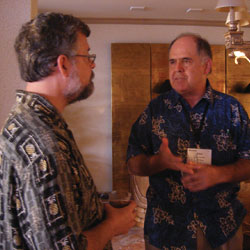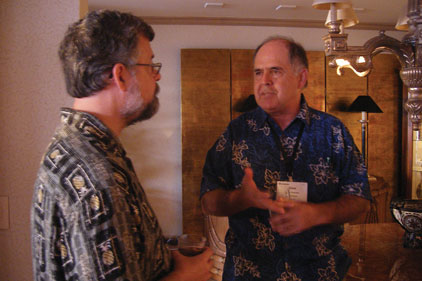
|
| HARDI economist Alan Beaulieu speaks with NEWS publisher John Conrad. |
So do you want the good news or the bad news first? Because there was both in the presentation economist Alan Beaulieu gave to the Heating, Airconditioning and Refrigeration Distributors International (HARDI) members at the recent HARDI Conference in Hawaii.
Let’s start with the good news. The topic that dominates most economic discussions is whether the United States is going to experience a double-dip recession. Beaulieu, who has been very accurate in his forecasts in the past, put everyone’s minds at ease.
“The answer is there will be no economic double dip. We are not going to slip into a recession tomorrow. Europe is not going to drag us down. Washington is not going to drag us down. For goodness’ sake get that out of your mind,” Beaulieu said. “When we are talking about a recession, we mean the definition of contraction of the economy. These days we are talking about a slower rate of rise. Some people want to call it a recession, but it isn’t. You are going to be busier next year. You are likely going to find yourself making money next year. You should be busier in 2013.
Beaulieu pointed out that the HVACR industry sales track with the economy and not the weather. He said it is important to look at the signs in the economy to see how it will drive business. The distributors in attendance were shown that the rate of change for industrial production is slowing down. In addition, the GDP is also slowing down but both numbers were still above zero showing that it is not a recession, but rather decreased growth.
“This economy is going to give you a lot in the next 7-10 years.”
Beaulieu based this thinking on numerous items, including:
• Leading indicators pointing up;
• Liquidity is not an issue;
• Exports are up;
• Stimulative monetary policy;
• Employment rising;
• Banks are lending;
• Normal seasonal rise in retail sales.
“Profits are up across the board. That means taxes will be paid. Businesses will be spending money. No massive layoffs,” Beaulieu said. “That means we have right-sized and are competitive. It means all kinds of good things going on. This is a reason to be encouraged about the future.”
Beaulieu’s group forecasted a 3.4 percent growth in 2011, which will be followed by a 4.3 percent growth in 2012. Looking further down the line, he sees a 3 percent growth in 2013, before a 2.9 percent dip in 2014.
LONG-TERM PROBLEMS
However, Beaulieu was not nearly as optimistic about the real long-term prognostications for the economy. Specifically, he is concerned by the rising U.S. debt and foresees another Great Depression coming 20 years from now.
The economist pointed out that the total U.S. debt as a percentage of the Gross Domestic Product is 120 percent. The last time it was this high was during World War II.
“Then the war ended, and it came back down. What is going to end this time? It is not like ending Afghanistan or ending Iraq is going to make a big difference. This is driven by Medicare, prescription drugs, and social security,” Beaulieu said. “America’s interest comes to $55,000 a second. This is wiping out the average income of an American every second of every day because of interest.”
Beaulieu cautioned that by 2020, interest and entitlement programs will be swallowing up the U.S. budget.
“We are on the road to disaster. That has a lot to do with the recession we are calling for in 2019 and even more to do with the Great Depression we are calling for in 2030. If you are over 55, then that is not an issue for you. If you are below 50 years of age, that will become an issue in your life. If you are in your thirties, talk to me later and we can work something out,” Beaulieu joked.
The economist did provide some answers for how the United States could get out of this situation. One would be to increase immigration of highly qualified skilled people who will create jobs. The second option is to find a new technology that comes along and changes the future. His final idea, he joked, was to start a war involving only old people.
Beaulieu reaffirmed that he sees nothing negative for 2012 and 2013.
“The world will be a better place in 2012 and that will help the U.S. economy. Growth is going to go down a little bit, but we are forecasting that is comes back in the second quarter of 2012, which is not a long time from now. Banks are lending. They want to lend. I know you don’t believe that, but they do. They are not lending to people who want to buy homes so that is bad for this industry,” Beaulieu said. “But corporately they are lending more. Small business loans are also up. You will have to negotiate more. If you have lots of cash, you will have access to capital. If you don’t have lots of cash, it is almost impossible.”
PREPARING FOR THE NEAR FUTURE
But with the economy picking up, the question that was asked of the distributors in attendance was if they were ready. Beaulieu had a number of suggestions.
The first was to save your cash. The economist believes that we are entering into an inflationary period, so he established that it was important to keep as much cash as you can.
“So when we talk about investing in your business, it is important to borrow the money and keep your cash. Save your cash. You want to keep as much cash as you can and use somebody else’s money to invest in your business,” Beaulieu said.
Beaulieu believes that we are entering into an inflationary period because Federal Reserve Chairman Ben Bernanke did the wrong thing by having interest rates so low. He believes the government should be incentivizing banks to lend instead of incentivizing consumers to borrow.
“This will lead to inflationary pressures later in 2012 going into 2013. These inflationary pressures can be impacting prices, inventory, and how we manage inventory. You will need to recalculate what inventory purposes should look like,” Beaulieu said. “Remember, you are going to have to pay employees more in an inflationary period. If wages go up by a smaller percentage compared to inflation, than the standard of living goes down. If standard of living goes down, your employees come to work angry. And if they come to work angry, they take it out on the customers. And if they take it out on the customers, you will find that there will be a growth profit erosion and market share erosion.”
Publication date: 11/28/2011



Report Abusive Comment